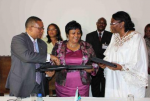Angola, Namibia and South Africa have signed the Benguela Current Convention, which establishes the first global multilateral Commission to apply the Large Marine Ecosystem (LME) approach to ocean governance.
The agreement creates a permanent inter-governmental institution responsible for promoting the long-term conservation and sustainable use of the Benguela Current Large Marine Ecosystem (BCLME), an ocean area extending from Port Elizabeth in South Africa to the province of Cabinda in the north of Angola.
 18 March 2013: Angola, Namibia and South Africa have signed the Benguela Current Convention, which establishes the first global multilateral Commission to apply the Large Marine Ecosystem (LME) approach to ocean governance. The agreement creates a permanent inter-governmental institution responsible for promoting the long-term conservation and sustainable use of the Benguela Current Large Marine Ecosystem (BCLME), an ocean area extending from Port Elizabeth in South Africa to the province of Cabinda in the north of Angola.
18 March 2013: Angola, Namibia and South Africa have signed the Benguela Current Convention, which establishes the first global multilateral Commission to apply the Large Marine Ecosystem (LME) approach to ocean governance. The agreement creates a permanent inter-governmental institution responsible for promoting the long-term conservation and sustainable use of the Benguela Current Large Marine Ecosystem (BCLME), an ocean area extending from Port Elizabeth in South Africa to the province of Cabinda in the north of Angola.
Considered one of the richest ecosystems on the planet, it is estimated that ecosystem services in this region could be worth approximately US$54 billion per year. The area supports offshore oil and gas production, marine diamond mining, coastal tourism, commercial fishing and shipping. According to the Food and Agriculture Organization of the UN (FAO), the main goal of the LME approach is to achieve the long-term sustainability of international and coastal aquatic resources by preventing, reducing and controlling the degradation of marine areas, while ensuring that human nutritional needs and social and economic development goals are met.
The Benguela Current Convention commits Angola, Namibia and South Africa to: prevent and eliminate pollution; conduct environmental impact assessments on activities potentially affecting marine and coastal regions; enhance the exchange of scientific information and human capacity; protect vulnerable species; and reverse, when possible, habitat alteration and destruction.
The United Nations Development Programme (UNDP) and the Global Environment Facility (GEF) have technically and financially supported the process of regional cooperation, including the creation of the Benguela Current Commission (BCC) in 2007. Participants in the ceremony held in Benguela, Angola, commended the three countries for providing a legal-framework to protect this important marine region. [GEF Press Release] [FAO LME] [UNDP Press Release]